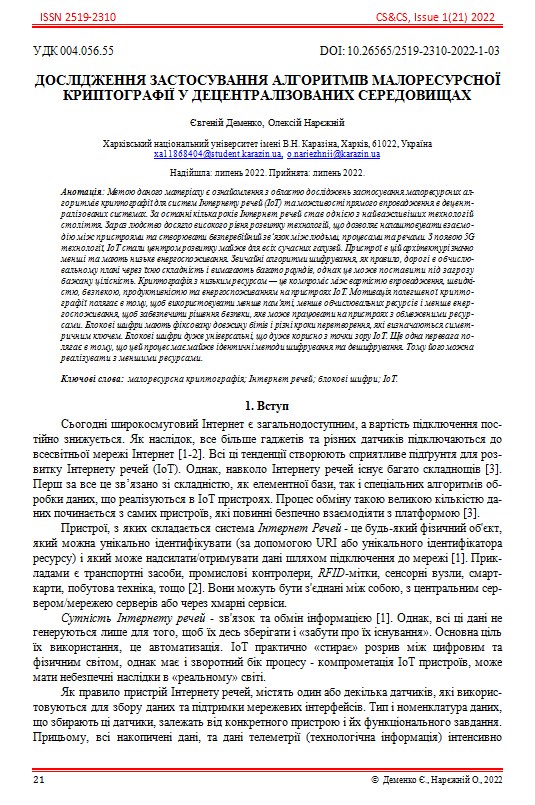Research of application of low-resource cryptography algorithms in decentralized environments
Abstract
The purpose of this material is to analysis of the application of low-resource cryptography algorithms for Internet of Things (IoT) systems and the possibility of their implementation in decentralized systems. Over the past few years, the Internet of Things has become one of the most important technologies of the century. Modern IT developments has reached a high level of technological development, which allows you to customize the interaction between IoT devices and provide connection between people. With the appearance of 5G technologies, the IoT has become the center of development, for almost to all modern industries. Devices in this architecture are significantly smaller and have low power consumption. Conventional encryption algorithms tend to be computationally expensive due to their complexity and require many processing rounds. Low-resource cryptography is a compromise between implementation cost, speed, security, performance, and power consumption on IoT devices. The motivation for lightweight cryptography is to use less memory, less computing resources, and less power consumption to provide a security solution that can run on resource-constrained devices. Block ciphers have a fixed length (of bits) and special transformation stages, which are determined by a symmetric key. Block ciphers are quite versatile, which is very useful from an IoT perspective. Another advantage is that block ciphers has nearly proportional encryption and decryption methods. Therefore, it can be implemented with fewer resources.
Downloads
References
Xia, F., Yang, L. T., Wang, L., & Vinel, A. (2012). Internet of Things. International Journal of Communication Systems, 25(9), 1101–1102. https://doi.org/10.1002/dac.2417
Jia, X., Feng, Q., Fan, T., & Lei, Q. (2012). RFID technology and its applications in Internet of Things (IoT). 2012 2nd International Conference on Consumer Electronics, Communications and Networks (CECNet). https://doi.org/10.1109/cecnet.2012.6201508
Gubbi, J., Buyya, R., Marusic, S., & Palaniswami, M. (2013). Internet of Things (IoT): A vision, architectural elements, and future directions. Future Generation Computer Systems, 29(7), 1645–1660. https://doi.org/10.1016/j.future.2013.01.010
Suo, H., Wan, J., Zou, C. and Liu, J. (2012) Security in the Internet of Things: A Review. IEEE International Conference on Computer Science and Electronics Engineering, Hangzhou, 23-25 March 2012, 648-651. https://doi.org/10.1109/ICCSEE.2012.373
McKay, K. A., Bassham, L., Turan, M. S., & Mouha, N. (2017). Report on lightweight cryptography. https://doi.org/10.6028/nist.ir.8114
ISO/IEC 29192-2:2012. (2012). Information technology — Security techniques — Lightweight cryptography — Part 2: Block ciphers. Retrieved from https://www.iso.org/obp/ui#iso:std:iso-iec:29192:-2:ed-2:v1:en.
Banik, S., Bogdanov, A., Isobe, T., Shibutani, K., Hiwatari, H., Akishita, T., & Regazzoni, F. (2015). Midori: A Block Cipher for Low Energy. Advances in Cryptology – ASIACRYPT 2015, 411–436. https://doi.org/10.1007/978-3-662-48800-3_17
Eisenbarth, T., Gong, Z., Güneysu, T., Heyse, S., Indesteege, S., Kerckhof, S., Koeune, F., Nad, T., Plos, T., Regazzoni, F., Standaert, F.-X., & van Oldeneel tot Oldenzeel, L. (2012). Compact Implementation and Performance Evaluation of Block Ciphers in ATtiny Devices. Progress in Cryptology - AFRICACRYPT 2012, 172–187. https://doi.org/10.1007/978-3-642-31410-0_11
Chandra, S., Paira, S., Alam, S. S., & Sanyal, G. (2014). A comparative survey of Symmetric and Asymmetric Key Cryptography. 2014 International Conference on Electronics, Communication and Computational Engineering (ICECCE). https://doi.org/10.1109/icecce.2014.7086640
Diehl, W., Farahmand, F., Yalla, P., Kaps, J.-P., & Gaj, K. (2017). Comparison of hardware and software implementations of selected lightweight block ciphers. 2017 27th International Conference on Field Programmable Logic and Applications (FPL). https://doi.org/10.23919/fpl.2017.8056808
Bogdanov, A., Knudsen, L. R., Leander, G., Paar, C., Poschmann, A., Robshaw, M. J. B., Seurin, Y., & Vikkelsoe, C. (2007). PRESENT: An Ultra-Lightweight Block Cipher. Cryptographic Hardware and Embedded Systems - CHES 2007, 450–466. https://doi.org/10.1007/978-3-540-74735-2_31
Shirai, T., Shibutani, K., Akishita, T., Moriai, S., & Iwata, T. (2007). The 128-bit blockcipher CLEFIA. In International workshop on fast software encryption, 181-195. Springer, Berlin, Heidelberg.
Federal Information Processing Standards Publication 197 Announcing the ADVANCED ENCRYPTION STANDARD (AES). (2001). Retrieved from https://nvlpubs.nist.gov/nistpubs/FIPS/NIST.FIPS.197.pdf
Moradi, A., Poschmann, A., Ling, S., Paar, C., & Wang, H. (2011). Pushing the Limits: A Very Compact and a Threshold Implementation of AES. Advances in Cryptology – EUROCRYPT 2011, 69–88. https://doi.org/10.1007/978-3-642-20465-4_6
Juels, A., & Weis, S. A. (2005). Authenticating Pervasive Devices with Human Protocols. Advances in Cryptology – CRYPTO 2005, 293–308. https://doi.org/10.1007/11535218_18
Grossschadl, J., Tillich, S., Rechberger, C., Hofmann, M., & Medwed, M. (2007). Energy Evaluation of Software Implementations of Block Ciphers under Memory Constraints. 2007 Design, Automation & Test in Europe Conference & Exhibition. https://doi.org/10.1109/date.2007.364443
Akishita, T., & Hiwatari, H. (2012). Very Compact Hardware Implementations of the Blockcipher CLEFIA. Selected Areas in Cryptography, 278–292. https://doi.org/10.1007/978-3-642-28496-0_17
Hatzivasilis, G., Fysarakis, K., Papaefstathiou, I., & Manifavas, C. (2017). A review of lightweight block ciphers. Journal of Cryptographic Engineering, 8(2), 141–184. https://doi.org/10.1007/s13389-017-0160-y
Dinu, D., Biryukov, A., Großschädl, J., Khovratovich, D., Le Corre, Y., & Perrin, L. (2015). FELICS - Fair Evaluation of Lightweight Cryptographic Systems. Retrieved from https://csrc.nist.gov/csrc/media/events/lightweight-cryptography-workshop-2015/documents/papers/session7-dinu-paper.pdf
Meiser, G., Eisenbarth, T., Lemke-Rust, K., & Paar, C. (2008). Efficient implementation of eSTREAM ciphers on 8-bit AVR microcontrollers. 2008 International Symposium on Industrial Embedded Systems. https://doi.org/10.1109/sies.2008.4577681


